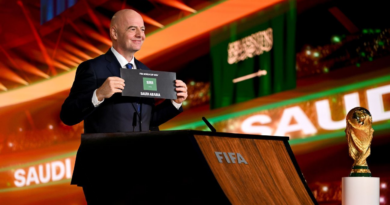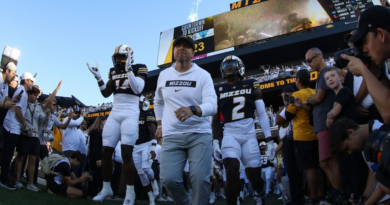A new chapter is about to be written in an epic rivalry
SYDNEY — England’s Dutch manager Sarina Wiegman has taken a crash course on the England–Australia sporting rivalry this week. The front page of Monday’s Australian Daily Telegraph would’ve helped bring her up to speed. The headline rang out: “Now for the Poms!”
The accompanying text detailed the tale of this summer’s sporting match-ups between the two nations: the battle for The Ashes in men’s and women’s cricket, and the recent netball World Cup final. In all three, it was Australia who took home the spoils. Now, with the two countries meeting again on Wednesday in their Women’s World Cup semifinal in Sydney, the local press and public want an Aussie clean sweep.
The narrative is hard to avoid. That’s what happens when these two meet. The 146-year history of the men’s Ashes has built the rivalry up. Monday’s edition of The Australian newspaper had a piece with a headline reading “An old enemy. A new battle. And an adoring nation holds its breath,” where it detailed the greatest sporting moments between the two teams, all under the banner of what it calls a “sporting blood feud.”
– Women’s World Cup: Landing page | Schedule | Rosters | News
– “The Far Post” — Listen to ESPN’s women’s football podcast
The stadium where Wednesday’s semifinal will take place also has special resonance for English sports fans. Back in 2003, it was Jonny Wilkinson’s drop goal in Stadium Australia that broke Australia hearts in the men’s rugby World Cup final, leading to the Sydney Morning Herald printing an apology to England the following day after a history of what they called “Pom-Bashing.”
The newspaper’s editorial read: “We officially remove the 215-year-old chip(s) from our weary shoulders and encourage all Australians to be nice to any person of English persuasion they come into contact with for the rest of the week … well, at least until the close of business today.” A brief glance through the annals suggests that was the last time an England sporting team from any code played in the famous stadium, seen the world over back in 2000 when Sydney hosted the Olympic Games. That was until the Lionesses played Colombia there on Saturday.
But away from the media hype and rose-tinted memories of sporting clashes between the two countries in the past, the Matildas and Lionesses are not engaging in that narrative. On Tuesday, Matildas coach Tony Gustavsson and goalkeeper Mackenzie Arnold faced the press. Gustavsson looked out across the packed news conference on the fourth floor of Stadium Australia, and said, smiling: “We’re going to need a bigger room I think.” The match has captured the world’s attention, but the more you talk about the rivalry between the two nations, the more it becomes apparent that it’s a mere subplot here, rather than an occasion being moulded by the rivalry narrative.
“Obviously there’s a massive rivalry between Australia and England in sports all over the place,” Arnold said. “That will be no different tomorrow, but at the same time we have a lot of rivalries in football. It will just be another game and we will try to focus on our gameplan and not get caught up in the rivalry.”
The same noises were coming from the England camp. “With the cricket and the netball, I understand why everyone else feels like that but for us it’s a semifinal regardless of who you are playing it is a massive game,” midfielder Keira Walsh said. “I wouldn’t say this is a major rivalry in football. They are a great team and it is a semifinal. Whoever you’re playing, it is going to be an intense game. So for us [the rivalry] is one of the last things we’re thinking of.”
The records show that the two sides having faced each other six times, with England winning three, drawing one and losing twice. Team GB also met Australia in the quarterfinals of the Tokyo Olympics, the Matildas winning 4-3 in extra time against a team featuring nine England players in the starting XI. England and Australia last met in Brentford back in April on a grim night of torrential rain in which the Matildas put together a masterful counter-attacking performance to end England’s 30-match unbeaten run with a 2-0 win.
On the men’s side, they’ve met seven times — England winning four, Australia once and two draws. Mark Schwarzer was in goal for their sole victory — a 3-1 friendly win for the Socceroos in February 2003. “I think the rivalry we have in cricket is definitely not the same in football, that goes without saying,” the former Fulham, Chelsea and Leicester City goalkeeper told ESPN. “I think that’s been mostly down to the fact that certainly in the men’s game England have never seen Australia on any level close enough to England to create a rivalry.
“I remember we played England in 2003 when Sven-Goran Eriksson was in charge. He had no idea about the rivalry. And I think even England players weren’t concerned at that time. But I remember going back to Middlesbrough after that and, and Gareth Southgate was disappointed not to have been selected, but also devastated that we beat them because I was just giving him so much stick about it.”
This is by far the biggest meeting between the two countries in football. But the teams are familiar; there are club teammates and friends on either side of the divide. Take the match-up between England’s defence and striker Sam Kerr; Millie Bright, Jess Carter and Kerr are all at Chelsea. “I think everyone knows her pretty well,” Bright said of Kerr. “On a worldwide stage she’s made a name for herself. There’s other players in the team, I think we’re prepared to play against Australia as a team.”
The influence and power of the Women’s Super League means 14 of the 23 players in the Matildas’ squad have had some experience of playing in England, with 10 at WSL clubs and another two having recently left. “There’s quite a few that would be from [Manchester] City, Arsenal, Manchester United,” says Australia goalkeeper Lydia Williams, who plays her club football for Brighton & Hove Albion. “We play against them, we know what their tendencies are, facing them week in, week out and watching them. It’s more of a chess match.”
The Sydney Morning Herald on Tuesday ran a headline “Why Kerr is Kryptonite for England’s superwoman,” detailing all the times Kerr has scored against Mary Earps. There’s familiarity and on-field history wherever you look, but predominantly rooted in domestic match-ups. Arnold knows her opposition so well, she won’t need to do as vigorous analysis as usual.
Ask the Matildas who they see as rivals, and they throw a blanket over a few teams. “You see it in a lot of men’s competitions — especially in cricket and rugby – but for us, we’ve had so many rivalries with other countries,” Williams says. “We’ve played against Brazil at every other World Cup. You could say that about America, you could say it about so many countries.”
There are also their trans-Tasman rivals. “The biggest internal rivalry is probably New Zealand, still,” Tameka Yallop said. “That’s always been our sort of, ‘We cannot lose to them, and we will not lose to them.’ That’s still a major one for us.”
0:36
Walsh hoping England can ‘quieten down’ Australian crowd in semifinal
Kiera Walsh speaks ahead of England’s Women’s World Cup semifinal against Australia.
But potentially England may be added to that list after Wednesday. “I think certainly in the women’s game this could be the start of a rivalry, absolutely,” Schwarzer said. “I think as much as it’s being played down in front of the media there, there’s an enormous amount of pride and desperation to win. First and foremost, they’re both desperate to get to a World Cup final. There’s also the added incentive of bragging rights: they play against each other, they’re in the same teams, so they know each other really well. It’s only natural.”
Moments after England’s win over Colombia, Wiegman was asked whether she understood the history behind England-Australia matches. “I just think it’s going to be really big but now I’ve had a couple of questions about that so it’s probably going to be bigger than I thought it was. I will speak to my players and staff to see what that rivalry is then.” A few days later, she touched on it again, saying: “I asked players and staff. For us, we didn’t feel that rivalry that much. The main thing is there is a lot of rivalry in rugby, cricket and netball. We just know it will be really competitive. They want to beat us and we want to beat them. That’s the main competitiveness.”
It was put to Arnold on Wednesday that a defeat to England, at this stage in the tournament given the two nation’s sporting history, would be “unthinkable.” She said: “Being knocked out by anyone is unthinkable. Yeah, there will be a lot of England fans that I’m sure would love to see us knocked out by them but I think there’s lots of Australians that would love for us to knock them out. There are rivalries with so many countries so it’s just another game for us. We just take it one game at a time and it’s worked so far so we’ll do the same again.”
At this stage of the tournament, the occasion and weight of opportunity and potential heartbreak hinging on the result transcends any sense of sporting history between the two countries. A World Cup semifinal is big enough to do that. As Gustavsson said, “this game has its own life.”




